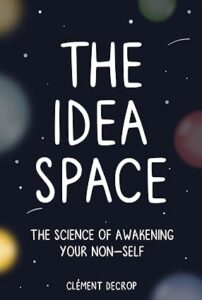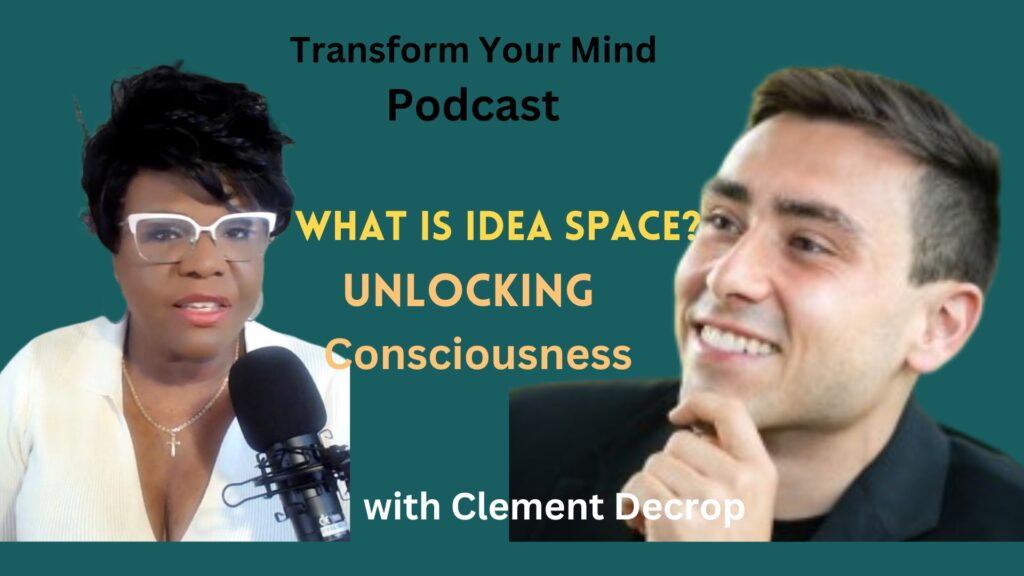In the ever-evolving exploration of consciousness, the concept of “Idea Space” emerges as a groundbreaking approach, offering a novel perspective that intertwines physics with cognitive understanding. Inventor and author Clement Decrop, through his book “The Idea Space: The Science of Awakening Your Non-Self,” challenges conventional views by delving into the depths of the human mind using the lens of scientific inquiry. This article captures the insights shared in a recent engaging podcast discussion with Decrop, unraveling the complex interplay between consciousness, physics, and mindfulness practices.
Download the podcast Here:
Key Takeaways
Revolutionary Concept: The Idea Space proposes a new mathematical model for understanding consciousness, inspired by physics, specifically through an innovative solution to Einstein’s field equations.
Mind Versus Consciousness: The conversation emphasizes exploring the mind’s nature, its location, and how meditative practices can lead to a profound understanding of one’s thoughts and emotions.
Application and Practice: Incorporating mindfulness and recognizing the impermanent nature of thoughts can lead to achieving mental clarity and well-being, shifting away from mysticism towards actionable insights.
The Idea Space: A New Approach to Understanding Consciousness
The groundbreaking concept of the Idea Space as introduced by Clement Decrop suggests a novel way to conceptualize the mind using principles borrowed from physics. Much of modern science focuses on tangible entities—like stars and planets—that can be measured and observed. However, Decrop invites us to use this scientific ideology to examine the mind’s intangibility.
He draws on Einstein’s field equation as a framework, describing how ideas and thoughts create a unique personal “space” for each individual. “The Idea Space…is a new mental model for the mind,” Decrop states, suggesting a shift from traditional psychological and biological paradigms. This shift allows individuals to view their internal landscapes—thoughts, emotions, and perceptions—through an objective and scientific lens, as intangible objects with “zero measure.”
Yet, as Decrop further explains, the challenge and beauty arise from the fact that the mind exists in a form that eludes external observation. The idea becomes less about pinpointing its physical location and more about understanding its implications and impact on personal cognition and awareness.

Meditation and Mindfulness: Tools for Observing Thought Patterns
Among the vital insights shared during the podcast was the role of meditation and mindfulness in engaging with one’s Idea Space. Decrop emphasizes the importance of observation as a method of self-inquiry: “If you want to study your mind, then sit down and observe it.” Drawing from various meditative traditions—such as Zen and Stoicism—the practice of mindfulness becomes a tool for gaining clarity.
Through mindfulness, individuals can engage with their thoughts without attachment, akin to observing passing clouds or balloons, which allows for a deeper understanding of personal beliefs and attitudes. Decrop notes, “let’s not hold onto that because that’s going to make me upset for the rest of the day,” offering listeners a practical technique for maintaining emotional equilibrium.
These practices move beyond mystical associations, grounding them in scientific inquiry—a perspective that Decrop seeks to demystify and make accessible. By contemplating the mind as an unfaltering sequence of thoughts and emotions, the Idea Space encourages a kind of cognitive liberation, where individuals learn to separate from unwanted mental narratives.

Idea Space: Personal Well-being and Scientific Exploration
The concept of the Idea Space reaches beyond theoretical exploration, holding significant potential for personal development and scientific advancement. Its clarity in defining a “science of the first person,” as Decrop labels it, invites a re-evaluation of how we perceive cognition and consciousness in practical terms.
This approach encourages individuals to recognize their unique perceptual experiences as part of a broader, interconnected narrative that ties subjective experience with universal constants. As Decrop articulates, “everybody’s perspective of the universe is unique to them,” underscoring the personal, yet scientific nature of conscious experience.
In the realm of applications, Decrop is currently developing an innovative Gen AI Meditation app, which promises personalized guidance, tailoring mindfulness practices to the individual’s immediate cognitive and emotional state. By making meditation accessible and relatable through technology, the Idea Space takes further steps towards improving mental wellness and understanding.
A Journey toward Understanding and Awakening
As technological and scientific insights continue to break barriers in cognitive exploration, the prospects of deeply understanding the human mind expand. Clement Decrop’s work with the Idea Space illuminates the path with a unique blend of scientific rigor and meditative awareness, prompting listeners and readers to actively engage with and challenge their conscious experiences.
The discussion in the podcast and the concepts outlined in “The Idea Space” reveal a vision of reality that is both quantifiable and ever-evolving, a reflection of Decrop’s statement: “If it gets disproved, great…and that means we’ll be able to telepathically speak to each other.” In doing so, they call into question long-held assumptions and encourage a future where the mysteries of the mind are not only explored but consciously embraced.
Additional Resources









